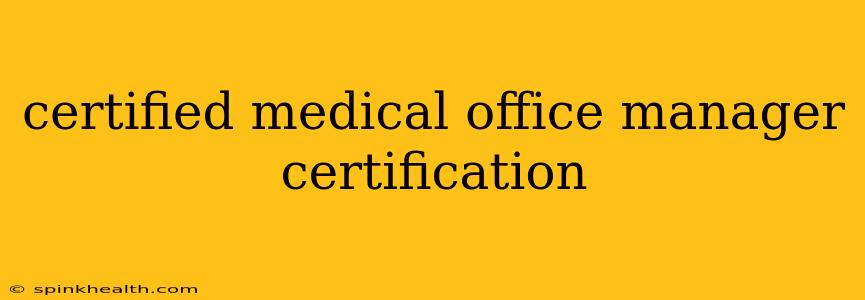The crisp white coat, the organized files, the calm amidst the chaos – this is the world of a medical office manager. It's a demanding yet incredibly rewarding career, demanding sharp organizational skills, a keen eye for detail, and a deep understanding of the healthcare industry. And while experience plays a crucial role, holding a recognized certification significantly boosts your credentials and opens doors to greater opportunities. But navigating the world of medical office manager certifications can feel overwhelming. This guide will illuminate the path, answering your key questions and helping you decide if certification is right for you.
What is a Certified Medical Office Manager?
A Certified Medical Office Manager (CMOM) – while the exact title may vary depending on the certifying body – isn't just a title; it's a testament to your expertise. It signifies that you’ve mastered the intricate skills needed to manage the day-to-day operations of a medical practice efficiently and effectively. This includes everything from scheduling appointments and managing patient records to handling insurance claims, overseeing staff, and ensuring regulatory compliance. Essentially, you are the backbone of a smoothly running medical practice.
What are the Benefits of Getting Certified?
The benefits of becoming a certified medical office manager extend far beyond just a certificate on your wall. It's an investment in your career, opening doors to:
- Increased Earning Potential: Certified medical office managers are often compensated more than their uncertified counterparts. The added credential demonstrates your commitment to professionalism and expertise, justifying a higher salary.
- Enhanced Job Opportunities: A certification significantly improves your chances of landing your dream job. Recruiters actively seek certified individuals, giving you a competitive edge in a demanding job market.
- Improved Career Advancement: Certification paves the way for career progression. It validates your skills and knowledge, positioning you for promotions and leadership roles within the healthcare sector.
- Greater Job Satisfaction: Knowing you possess the skills and recognition to excel in your role leads to increased confidence and job satisfaction.
- Professional Credibility: Certification elevates your professional standing within the healthcare community, establishing you as a knowledgeable and reliable expert.
What are the Different Types of Medical Office Manager Certifications?
There isn't one single universally recognized "Certified Medical Office Manager" certification. Instead, various organizations offer certifications, each with its own specific requirements and focus. Some popular options include certifications offered by professional organizations focused on medical administration, as well as those offered by colleges and universities. Researching these different options carefully is crucial to finding the best fit for your individual career goals and learning style.
How Much Does a Medical Office Manager Certification Cost?
The cost of certification varies widely depending on the organization, the length of the program, and the included materials. Expect to invest several hundred to several thousand dollars. However, many find the investment worthwhile, considering the long-term benefits to their career trajectory and earning potential.
How Long Does It Take to Become a Certified Medical Office Manager?
The time commitment also varies greatly. Some programs are completed in a few months through online courses, while others may require more extensive in-person training and coursework, spanning several semesters. The length of your program depends on the specific certification you choose and whether you're pursuing it full-time or part-time.
Is a Certification Necessary to Become a Medical Office Manager?
While not always strictly required for entry-level positions, a certification is highly recommended. It provides a significant competitive advantage and demonstrates your commitment to the profession. In today's competitive healthcare market, holding a certification can be the deciding factor between you and another candidate.
What Skills Are Needed to Become a Certified Medical Office Manager?
A successful medical office manager possesses a diverse skill set, including:
- Strong organizational and time management skills: Managing appointments, patient records, and staff requires meticulous organization and the ability to prioritize tasks effectively.
- Proficiency in medical terminology and coding: Understanding medical terminology and insurance coding is crucial for accurate billing and claim processing.
- Excellent communication and interpersonal skills: Effective communication with patients, doctors, insurance companies, and staff is essential.
- Proficiency in computer software and technology: Medical office managers need to be comfortable using electronic health records (EHRs) and other relevant software.
- Knowledge of medical regulations and compliance: Staying up-to-date with healthcare regulations and ensuring compliance is paramount.
The journey to becoming a certified medical office manager is an investment in your future. By carefully researching the various certification options available, understanding the associated costs and time commitments, and developing the necessary skills, you can position yourself for a successful and rewarding career in the dynamic world of healthcare. Remember, the certification is not just a piece of paper; it's a symbol of your dedication and expertise, setting you apart in a competitive field and opening doors to exciting opportunities.

